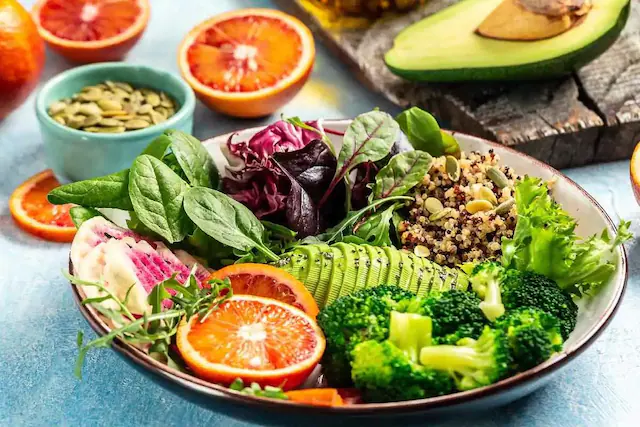Healthy lifestyle has become increasingly important. One of the key components of a healthy lifestyle is nutrition. The food choices we make play a significant role in our overall well-being. In this article, we'll explore the top 8 foods that are not only delicious but also incredibly nutritious, providing numerous health benefits.
Leafy Greens

Leafy greens are nutritional powerhouses packed with vitamins, minerals, and antioxidants. They are low in calories and high in fiber, making them ideal for weight management and digestive health. Spinach, kale, and Swiss chard are just a few examples of leafy greens that should be incorporated into your diet regularly. These vegetables are rich in vitamins A, C, and K, as well as folate and iron.
Berries
Berries are not only delicious but also loaded with antioxidants that help protect the body against oxidative stress and inflammation. Blueberries, strawberries, raspberries, and blackberries are among the most popular varieties of berries. They are rich in vitamins, particularly vitamin C, and minerals like potassium and manganese. Adding a handful of berries to your morning cereal or yogurt can provide a flavorful and nutritious boost to your day.
Fatty Fish
Fatty fish such as salmon, mackerel, and sardines are excellent sources of omega-3 fatty acids, which are essential for heart health and brain function. Omega-3 fatty acids have been shown to reduce the risk of heart disease, lower blood pressure, and improve cognitive function. Additionally, fatty fish are rich in protein, making them a satisfying and nutritious option for meals.
Nuts and Seeds
:strip_icc()/nuts-assortment-on-rustic-wood-table--695071562-f4d79f7310c141f680c446600aeb2ddc.jpg)
Nuts and seeds are nutrient-dense foods that are rich in healthy fats, protein, fiber, vitamins, and minerals. Almonds, walnuts, chia seeds, and flaxseeds are just a few examples of nuts and seeds that offer numerous health benefits. Incorporating a variety of nuts and seeds into your diet can help reduce the risk of chronic diseases such as heart disease, diabetes, and certain cancers.
Whole Grains
Whole grains are an essential part of a balanced diet as they provide energy, fiber, and important nutrients. Examples of whole grains include oats, quinoa, brown rice, and whole wheat. Unlike refined grains, which have been stripped of their nutrient-rich outer layer, whole grains retain all parts of the grain, including the bran, germ, and endosperm. This makes them a much healthier option and helps regulate blood sugar levels and promote digestive health.
Yogurt
Yogurt is a fermented dairy product that is rich in probiotics, which are beneficial bacteria that promote gut health. Consuming yogurt regularly can help maintain a healthy balance of bacteria in the gut, which is essential for proper digestion and immune function. Greek yogurt, in particular, is high in protein and calcium, making it a nutritious and versatile food that can be enjoyed on its own or used as a base for smoothies and dips.
Lean Proteins

Lean proteins such as chicken breast, turkey, tofu, and legumes are essential for building and repairing tissues, hormones, enzymes, and antibodies in the body. They are rich in high-quality protein, vitamins, and minerals, with minimal saturated fat and cholesterol. Incorporating lean proteins into your diet can help maintain muscle mass, promote weight loss, and support overall health.
Cruciferous Vegetables
Cruciferous vegetables such as broccoli, cauliflower, Brussels sprouts, and cabbage are known for their cancer-fighting properties. These vegetables contain compounds called glucosinolates, which have been shown to inhibit the growth of cancer cells and reduce inflammation in the body. Additionally, cruciferous vegetables are rich in vitamins C, E, and K, as well as fiber, making them an excellent choice for promoting overall health and well-being.
Conclusion
Incorporating these top 8 foods into your diet can have a profound impact on your health and well-being. From leafy greens and berries to fatty fish and nuts, each of these foods offers unique nutritional benefits that can support overall health and vitality. By making small changes to your diet and incorporating more of these nutrient-rich foods, you can take important steps towards achieving and maintaining optimal health.
FAQs
Q. Can I eat these foods if I have dietary restrictions?
Ans: Yes, many of these foods are versatile and can be adapted to fit various dietary needs. For example, if you're vegetarian or vegan, you can still enjoy leafy greens, berries, nuts, seeds, and whole grains.
Q. How can I incorporate these foods into my diet if I'm not used to eating them?
Ans: Start by experimenting with different recipes and cooking methods to find ways to incorporate these foods into your meals. For example, you can add leafy greens to salads, smoothies, or stir-fries, and berries can be enjoyed as a snack or added to oatmeal or yogurt.
Q. Are there any potential side effects of eating these foods?
Ans: While these foods are generally safe for most people, it's always a good idea to consult with a healthcare professional if you have any concerns or underlying health conditions.
Q. Can I still enjoy other foods while incorporating these into my diet?
Ans: Absolutely! These foods are meant to complement a balanced diet that includes a variety of fruits, vegetables, whole grains, lean proteins, and healthy fats.
Q. How do I know if I'm getting enough of these foods in my diet?
Ans: Pay attention to how you feel after incorporating these foods into your meals. If you notice improvements in energy levels, digestion, and overall well-being, chances are you're on the right track.
